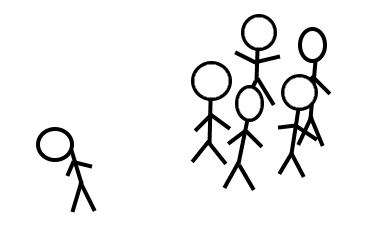A new review article from our researchers shows that being socially excluded from groups influences information processing in various ways.
Several studies have shown that being rejected by others temporarily enhances processing of social information. Socially excluded individuals, for instance, remember social information particularly well. Excluded people are also better than control groups at distinguishing between genuine and fake smiles, and are more accurate at identifying vocal tones.
Social exclusion even influences which stimuli will be consciously detected. When participants have been presented with facial images in a way that the faces will only occasionally access awareness, the faces of people who have previously rejected the participants have been detected especially well. Exclusion also influences attention. In many laboratory studies, socially excluded participants have tended to allocate their attention to smiling faces.
Exclusion has also been shown to influence evaluations of social stimuli. Many studies have found that rejected participants have judged other people as especially pleasant and attractive. This may be related to their need to form new relationships. In other studies, socially excluded people have viewed others as threatening and unapproachable. This may be a way to protect oneself from further hurt.
– It would be important to study which psychological processes cause these effects, says PhD student Aleksi Syrjämäki.
– For instance, future research should investigate how exclusion influences attentional, perceptual, and memory processes. This research might help us understand why some people are particularly vulnerable to social exclusion.
Syrjämäki, A. H. & Hietanen, J. K. (2018). The effects of social exclusion on processing of social information – A cognitive psychology perspective. British Journal of Social Psychology. http://dx.doi.org/10.1111/BJSO.12299
Suomeksi / in Finnish: http://www.uta.fi/ajankohtaista/uutinen/sosiaalinen-hyljeksinta-muuntaa-tiedonkasittelya

